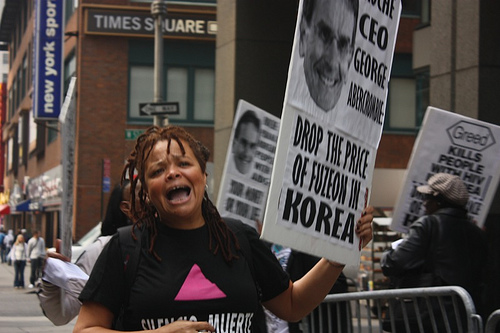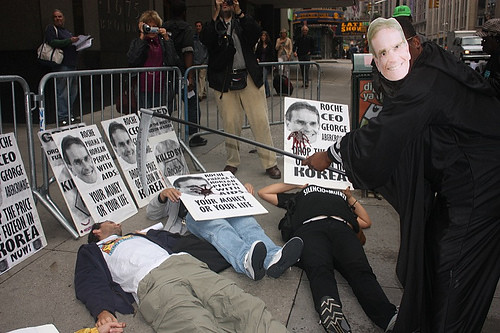The ongoing economic meltdown is terrifying, but at the same time many of us have no real idea of what’s rolling down the pike at us.
There are many aspects of the crisis and the coming recession which are impossible to predict. One impact though, will be unavoidable: crippling budget crises at the state and municipal levels, driven by falling real estate values, layoffs, business closings, increased borrowing costs and recession.
What Happens When the Banks Don’t Lend
To get a sense of what this could look like, it is instructive to look at what happened to New York City starting in 1975, when bank credit dried up and a fiscal crisis kicked in that was to last more than a decade. Remember that this was a budget crisis isolated to a single city, rather than the generalized collapse of the banking system we are seeing now.
The immediate background is that by the early ’70s, the City’s budget was deep in the red, kept going with fiscal jiggery-pokery especially in Mayor Lindsay’s second administration and under his successor, Mayor Beame. The back story is more complex of course, having much to do with federal policy since the Eisenhower administration which directed resources to suburbanization at the expense of city and country–money for interstates, not mass transit and railroads, subsidizing vast auto-dependent tracts of single houses on what had been farmland–you know the deal.
What plunged the City into crisis was the large banks refusing, collectively, in March, 1975 to extend credit to New York any longer, declining to roll over loans and boycotting the City’s bond auctions. The Beame administration moved to lay off 25,000 city workers and defer contractual raises for others, cut services, increase the transit fare and institute tuition in the City College of New York system.
For months there was a political war over how things would get resolved, with highway workers, cops and other city employees staging militant demonstrations and threatening an October general strike. The NY State government stepped in with aid but the federal government refused until massive pressure from the financial industry was brought to bear.
With everyone staring into the abyss of bankruptcy (and the possibility of a judge writing off the bonds the banks still held or canceling union contracts), the municipal unions made a devil’s pact with the banks, the details of which I leave for another post.
“The Bronx Is Burning”
What I want to remind people of is what happened to NYC once the austerity, service cuts, layoffs, tighter credit, tax hikes and the rest of the bank-sponsored “rescue package” kicked in.
Garbage piled up in the streets, and law enforcement abandoned whole neighborhoods. The public education system, already jolted by the refusal in the ’60s of Blacks and Latina/os to accept a two-tier, heavily segregated system, now faced serious cuts. Class sizes ballooned. “Non-essential” programs like art and music education and vocational training disappeared.
The Transit Authority adopted a policy of “deferred maintenance”–only fixing things when they broke down completely. One leader of the militant opposition within Transport Workers Union, Local 100 at the time, Arnold Cherry, pointed out whenever he spoke that every housewife knows that if you don’t empty the crumbs out of the toaster, eventually it stops working. Not TA management, though–the system veered toward total collapse in the early ’80s.
Meanwhile, landlords in “bad neighborhoods” emulated the Transit Authority, milking their aging apartment buildings for every dime in rent they could collect while “deferring” maintenance, laying off supers, ignoring heating oil bills, and finally abandoning the buildings themselves rather than pay city taxes. Or, given a chance, burning them down to collect the insurance.
This was seared into the national consciousness in the famous blimp shot of a five-alarm fire in the South Bronx during the 1977 World Series while Howard Cosell intoned, “There it is, ladies and gentlemen, the Bronx is burning.” As much as 40% of the housing stock in the borough was destroyed during these years, feeding an impossible-to-ignore homeless population and pumping up rents for vacant apartments in surviving buildings. (The City, meanwhile, was closing firehouses as a money-saving measure.)
Huge cuts in the NYC medical system on top of deteriorating social conditions laid the ground work for what Nick Freudenberg and his co-authors identify as a deadly “syndemic”: the three interlinked epidemics of TB, murder and HIV infection.
Even after the emergency financial aid was paid back, and the City’s budget was balanced and the banks decided they would once again buy long term bonds issued by the city (1981) , the Emergency Financial Control Board kept austerity policies in place and the damage they did to millions of people reverberated through the decade and up to the present. To cite only one example, the City College system which had boasted free tuition for NYC residents before the crisis, now costs upwards of $2000 a semester.
What It Means
I could go on. There are a lot of particular lessons to learn from the New York City fiscal crisis, and how various social forces responded and what kinds of popular resistance developed and worked.
But lesson number one is that this kind of crisis is on the agenda right now, in cities around the country, and once it erupts, there is no quick bounceback. Start trying to size up the situation where you live and figure out who your allies are going to be in the coming years.
Crossposted from Fire on the Mountain.


